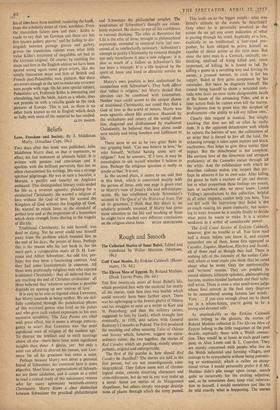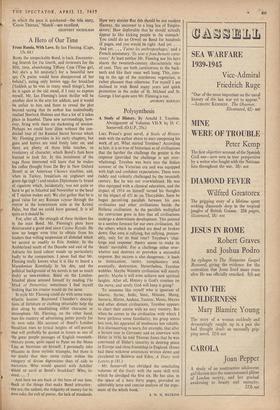Rough and Smooth
The Eleven Men of Eppynt. By Roland Mathias. (Dock Leaves Press, 10s. 6d.) THE first twenty-six years of Isaac Babel's life, which provided, him with the material for nearly all his stories, took him into two worlds which could scarcely have been farther apart. There was his upbringing in the Jewish ghetto of Odessa and his struggles to exist as a writer in Kiev and St. Petersburg; and then the military career, suggested to him by Gorki, which brought him eventually, in 1920, into action with General Budenny's Cossacks in Poland. The first produced the touching and often amusing Tales of Odessa and Stories which, however, suggest no extra- ordinary talent; the two together, the stories of Red Cavalry which are puzzling, Mostly unsym- pathetic, original and unforgettable.
The first of the puzzles is, how should Red Cavalry be classified? The stories are told in the first person, but are not unambiguously auto- biographical. They follow some sort of chrono- logical order, contain recurring characters and cross-references, but do not in any way make up a novel. Some are stories of de Maupassant shapeliness, but others simply one-page descrip- tions of places through which the army passed. This leads on to the bigger puzzle : what was Babel's attitude to the events he described?
Only when he is personally involved in the
action do we get any overt indication of what is passing through his mind. Implicitly as a Jew, explicitly as an intellectual, a four-eyed pen- pusher, he feels obliged to prove himself as capable of direct action as the next man. But since the next man is a Cossack, uncouth, un- thinking, unafraid of being killed and, more important, of killing, he is bound to fail. By killing a goose in a revolting way and forcing its owner, a peasant woman, to cook it for his supper, Babel at first gains acceptance by his comrades. But twice he disgraces himself. He cannot bring himself to shoot a. wounded com- rade who fears an even more disagreeable death
at the hands of the advancing Poles, and in a
later action finds he cannot even kill the enemy. He implores fate to grant him 'the simplest of proficiencies—the ability to kill my fellow men.'
Clearly this request is ironical. But simply knoWing that does not tell us what he really feels. It is the apparent detachment with which he reports the horrors of war, the callousness of an army that is forced to live off the land, the sickening revenge it takes upon traitors and black marketeers, that helps to give these stories their impact. But the detachment is not complete. His envious love of the directness and arrogant proficiency of the Cossacks comes through all the while. And the exhilaration with which he describes violende makes You suspect that per- haps he admires it for its own sake. After killing the goose he feels a mixture of joy and shame; but in what proportion these feelings are mixed, here or anywhere else, we never know. Lionel Trilling's introduction to this collection, helpful in all other respects, cannot help you here. You are left with the impression that Babel is not so much making his point ironically, but resort- ing to irony because he is unable finally to decide what point he wants to make. It is a serious weakness in a writer of considerable power.
The Gulf Coast Stories of Erskine Caldwell, however, give no trouble at all. You have read half a dozen before you, know it, and cannot remember one of them. Some first appeared in Cavalier, Esquire, Manhunt, Playboy and Swank; all of them read as though they had. There is nothing left of the intensity of the earlier Cald- well which at least made you think that he cared about what he wrote. Only the sentimentality and 'wryness' remain. They are peopled by cussed oldsters, kittenish spinsters, philosophising barmen, mutton-headed husbands and their baby- doll wives. There is even a wise small-town judge whose final remark in the final story deserves to be remembered among famous last words : 'Fern . . . if you care enough about me to shoot me in a whore-house, you're going to be a loving and devoted wife.'
As unmistakably as the Erskine Caldwell stories belong to the glossies, the stories of Roland Mathias collected in The Eleven Men of Eppynt belong to the little magazines of the past decade, especially those with a Welsh connec- tion. They would be at home in such good com- pany as Alun Lewis and B. L. Coombes. They are mostly concerned with people who live in the Welsh industrial and farming villages, and manage to be sympathetic without being patronis- ing or sentimental; which is rather an excep- tional virtue. I would personally prefer it if Mr. Mathias didn't pile image upon image, search quite so inexorably for the striking adjective, and, as he sometimes does, keep vital informa- tion to himself. I would sometimes just like to be told exactly what is happening. The stories in which the pace is quickened—the title story, 'Cassie Thomas; 'Match'—are excellent,
GEOFFREY NICHOLSON



































 Previous page
Previous page